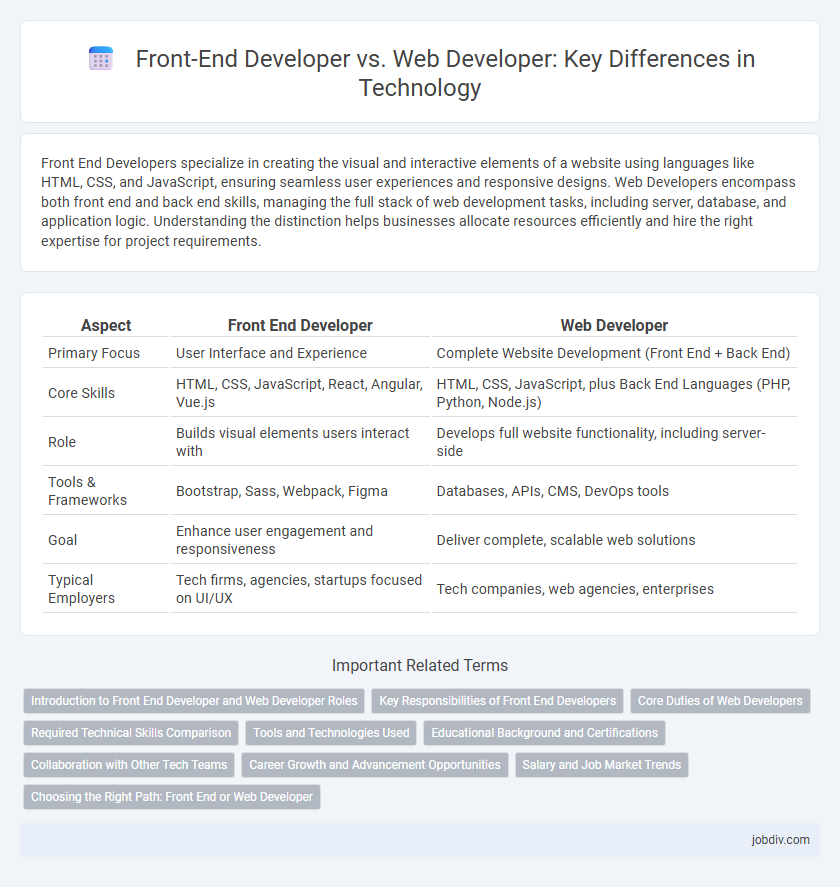Front End Developers specialize in creating the visual and interactive elements of a website using languages like HTML, CSS, and JavaScript, ensuring seamless user experiences and responsive designs. Web Developers encompass both front end and back end skills, managing the full stack of web development tasks, including server, database, and application logic. Understanding the distinction helps businesses allocate resources efficiently and hire the right expertise for project requirements.
Table of Comparison
| Aspect | Front End Developer | Web Developer |
|---|---|---|
| Primary Focus | User Interface and Experience | Complete Website Development (Front End + Back End) |
| Core Skills | HTML, CSS, JavaScript, React, Angular, Vue.js | HTML, CSS, JavaScript, plus Back End Languages (PHP, Python, Node.js) |
| Role | Builds visual elements users interact with | Develops full website functionality, including server-side |
| Tools & Frameworks | Bootstrap, Sass, Webpack, Figma | Databases, APIs, CMS, DevOps tools |
| Goal | Enhance user engagement and responsiveness | Deliver complete, scalable web solutions |
| Typical Employers | Tech firms, agencies, startups focused on UI/UX | Tech companies, web agencies, enterprises |
Introduction to Front End Developer and Web Developer Roles
Front End Developers specialize in creating the visual and interactive elements of websites using HTML, CSS, and JavaScript, ensuring seamless user experiences across devices. Web Developers encompass a broader scope, including both front end and back end development tasks such as server-side programming, database management, and API integration. Understanding the distinction between these roles highlights the Front End Developer's focus on client-side design and usability, while Web Developers handle full-stack solutions.
Key Responsibilities of Front End Developers
Front End Developers specialize in creating the user interface and enhancing user experience by writing clean, efficient HTML, CSS, and JavaScript code to build responsive, visually appealing websites and applications. They collaborate closely with UI/UX designers and back-end developers to implement design prototypes, optimize site performance, and ensure cross-browser compatibility. Key responsibilities include debugging interface issues, maintaining code quality, and integrating APIs to create seamless interactive features.
Core Duties of Web Developers
Web developers design, code, and maintain websites, ensuring seamless functionality across browsers and devices. Their core duties include integrating backend services, optimizing performance, and managing databases to support dynamic content delivery. They collaborate with designers and front end developers to implement user-friendly interfaces while maintaining robust server-side operations.
Required Technical Skills Comparison
Front End Developers primarily require expertise in HTML, CSS, JavaScript, and frameworks such as React or Angular to create interactive user interfaces. Web Developers need a broader skill set including server-side languages like PHP, Python, or Node.js, along with database management and understanding of HTTP protocols. Both roles demand proficiency in version control systems like Git and familiarity with responsive design principles to ensure seamless user experiences across devices.
Tools and Technologies Used
Front End Developers primarily utilize HTML, CSS, and JavaScript frameworks such as React, Angular, or Vue.js to create user interfaces and ensure responsive design. Web Developers have a broader skill set that includes front-end technologies along with back-end programming languages like PHP, Python, Ruby, or Node.js, and database management tools such as MySQL or MongoDB. Both roles rely on version control systems like Git and build tools such as Webpack or Gulp to streamline development and deployment processes.
Educational Background and Certifications
Front End Developers typically possess skills in HTML, CSS, JavaScript, and frameworks like React or Angular, often supported by a degree in computer science, web development, or related fields. Web Developers may have broader expertise covering both front-end and back-end technologies, with educational backgrounds ranging from coding bootcamps to formal degrees and certifications such as Certified Web Developer or Microsoft Technology Associate. Industry-recognized certifications like W3Schools Front End Certification and Google Mobile Web Specialist reinforce practical knowledge and enhance employability in both roles.
Collaboration with Other Tech Teams
Front End Developers specialize in crafting user interfaces and collaborate closely with UX/UI designers to ensure seamless visual experiences, while Web Developers often manage the full stack, integrating backend functionalities with front-end components. Both roles require effective communication with backend developers, DevOps teams, and product managers to align technical requirements and deliver cohesive web applications. Streamlined collaboration using tools like Git, Jira, and Slack enhances project workflow and accelerates deployment cycles.
Career Growth and Advancement Opportunities
Front End Developers specialize in building user interfaces using technologies like HTML, CSS, and JavaScript, which positions them for career growth in roles such as UI/UX Designer, Front End Architect, or Product Manager. Web Developers often have broader expertise, including back-end programming languages like Python, PHP, or Ruby, enabling advancement into Full Stack Developer, DevOps Engineer, or Technical Lead roles. Understanding industry demand for skills like React, Angular, Node.js, and cloud platforms accelerates career progression in both fields.
Salary and Job Market Trends
Front End Developers earn an average salary ranging from $70,000 to $110,000 annually, reflecting high demand for skills in HTML, CSS, and JavaScript frameworks like React and Angular. Web Developers, with broader responsibilities encompassing both front-end and back-end tasks, typically see salaries between $60,000 and $105,000, influenced by proficiency in languages such as PHP, Python, or Ruby. Current job market trends indicate a growing need for specialized front-end expertise due to the emphasis on user experience and responsive design, while full-stack Web Developers remain valuable for versatile project roles.
Choosing the Right Path: Front End or Web Developer
Front End Developers specialize in creating visually engaging user interfaces using HTML, CSS, and JavaScript, focusing on user experience and responsive design. Web Developers, encompassing both front end and back end, handle the full development stack, integrating server-side logic, databases, and APIs for complete website functionality. Choosing the right path depends on whether you prefer designing intuitive user-facing elements or managing comprehensive web application architecture.
Front End Developer vs Web Developer Infographic

 jobdiv.com
jobdiv.com